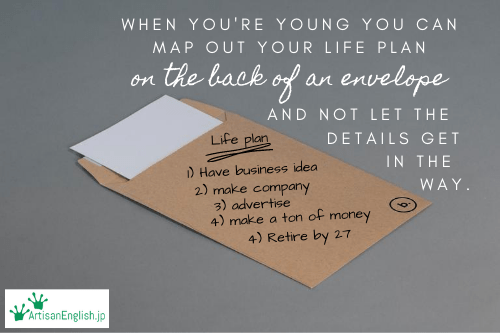
YouTube / iTunes / Spotify / Radio Public / Pocket Casts / Google Podcasts / Breaker / Overcast
Listen to ArtisanEnglish.jp posts & lesson intros here.
Phrase: On the back of an envelope
I’m not sure how familiar you are with start-ups, but many prominent companies and fantastic ideas were born on the back of an envelope.
As you can imagine, there is not much space on the back of an envelope.
Therefore, that limited amount of space forces you to articulate your ideas concisely.
Yes, of course, you are not thinking about all the details, but you’re not supposed to at that point.
You only need to put the gist of your idea on paper and work out the details later.
At the moment, I am listening to a podcast about how Gimlet media was created.
The two partners wrote the basics of their partnership agreement on the back of a napkin.
Yes, we can say that too.
These days, napkins are more commonly available than envelopes.
When was the last time you had a spare envelope in your pocket?
Like or follow ArtisanEnglish.jp on social media.
It was and still is common for two people to have a conversation, come up with a plausible business idea, jot down the basics of the concept on the back of an envelope/napkin and then develop it from there.
It’s one reason why tech companies such as Google and Facebook have such large open-plan campuses.
They want to encourage serendipity.
You can’t sit down and force yourself to come up with great plans.
They often come to you at inopportune moments when you have nothing to capture them on before you forget them.
That’s why I have the Google Keep and Evernote apps on my phone; there’s never a piece of paper around when you need one, and besides, who carries around a pen anymore?
Flesch-Kincaid Readability Test
This post is understandable by someone with at least an 8th-grade education (age 13 – 14).
On the Flesch-Kincaid reading-ease test, this post scores 69.
The easier a passage is to read, the higher the score on a scale of 0 – 100.

